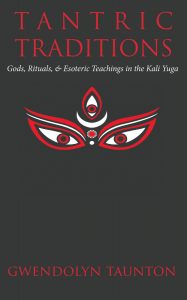Taunton on Tantra:
A Guide for the Perplexed Westerner
James J. O'Meara
Gwendolyn Taunton
Tantric Traditions: Gods, Rituals, & Esoteric Teachings in the Kali Yuga
Manticore Press, 2018
Mention “tantra” and almost any Westerner, no matter how sophisticated, thinks of weekend seminars on how to improve your sex life, with endorsements from the likes of Sting. In this book, Gwendolyn Taunton — a widely-published and well-regarded esoteric writer and publisher — brings real scholarship, and a hint of secret knowledge, to the task of rescuing Tantra from the misunderstandings and misappropriations of the West.
Since the modern Westerner values sex and rebellion above all, it’s not surprising that only the most superficial aspects of Tantra have been appropriated. Through a close study of the original texts, Taunton shows that Tantra, far from being antinomian and anti-Traditional, is actually firmly rooted in the very oldest strata of the Vedas; indeed, a chapter devoted to the study of the Hindu doctrine of cyclical time shows that the Tradition itself implies that the last Age, our own Kali Yuga, must develop its own methods of working with, rather than against, darkness, inertia, and materialism, precisely in order to preserve Order (dharma) and keep the path to liberation open.
For example, Tantra does not invalidate the caste system, but recognizes the mixing of castes and proposes its own fifth caste which combines the others; in this way, Tradition is honored while decadence is acknowledged and contained (rather than promoted or celebrated, as the Westerner does in his obsession with being “transgressive”). Taunton demonstrates throughout that Tantra’s transgressions are all committed from within Tradition and done so to preserve sacred Order.
The chapter on cyclical time alone is worth the price of admission; especially as it also includes a discussion of how the Traditionalists (Daniélou, Evola, and Guénon) have made it central to their own doctrines and thereby injected it into the wider Western consciousness. The most influential of these is Evola, and Taunton closely studies his adaptation of Tantra for the West, which is authentic yet idiosyncratic. Taunton also puts Evola’s relations with Fascism in perspective; like Tantra itself, Evola was simply using the available material to construct a bulwark for Order and Tradition in the degenerating modern world.
Other chapters deal with the various gods and goddesses associated with Tantra, showing how their multitudinous and contradictory forms are the sign of their reconciliation of mundane opposites into a higher unity.
Taunton also explicates lesser-known aspects of Tantra, such as the role of sacred places (“Topographical Religiosity”), and the very important and well-developed Hindu doctrines of sight and sound (“Lexicographical Gnoseology”), ritual elements to which the West has paid scant attention in its own traditions. In all cases, Taunton resolves their apparently wild and outré Tantric manifestations into well-grounded, conservatively-intended extensions (the meaning of the word Tantra) of the Vedic traditions.
The typically impatient Western reader who perseveres to the end will be rewarded with a chapter on Tantric spells and rituals for gaining power in the world of the Kali Yuga, complete with Appendices of mantras and alchemical correspondences; the material may be startling, but again, the discussion is sober and non-sensationalistic, with no more emphasis than given by the Tantric texts and traditions themselves.
I respectfully disagree with an earlier reviewer on Amazon: rather than being “not for non-specialists,” this book is just what they need!
Taunton%20on%20Tantra%3A%20A%20Guide%20for%20the%20Perplexed%20Westerner
Enjoyed this article?
Be the first to leave a tip in the jar!
Related
-
Get to Know Your Friendly Neighborhood Habsburg
-
Nowej Prawicy przeciw Starej Prawicy: Przedmowa
-
Stalin’s Affirmative Action Policy
-
Doxed: The Political Lynching of a Southern Cop
-
James M. McPherson’s Battle Cry of Freedom, Part 2
-
James M. McPherson’s Battle Cry of Freedom, Part 1
-
National Socialism as a Magical Movement: Stephen E. Flowers’ The Occult in National Socialism
-
Communist Barbarism in Hungary — and America Today: When Israel Is King

1 comment
Despite having been re-investigated by Traditionalist school and adopted among many currents within historical and contemporary Right, Tantra, when understood on a truly operative level, is still beyond the comfort zone of a typical Rightist. Especially so when one needs to internalize instructions that pertain to control of one’s passions, inclinations and prejudices, since after all, one must be able to leave behind hatred, aversion, opposition and other stimuli that belong to the “flux”.
This might be difficult to reconcile with the position of conflict in which The Right is frequently found. So, careful investigation on a purely impersonal level is advised prior to any enthusiastic adoption of Tantra merely due to it being “prescribed’ by this or that Right wing figure. I see that author of this book also notes that such thinkers have known to occasionally make idiosyncratic portrayals, but truth be told, even such expositions of Tantric practices that belong to a more “New Age” angle, are indeed perfectly compatible with The Right on an exoteric plane, since I believe more pessimistically oriented Rightists, with a greater degree of resoluteness to remain detached from the paradigm of today, have better predispositions to utilize it in the way that does not betray the goal of such practices.
Comments are closed.
If you have Paywall access,
simply login first to see your comment auto-approved.
Note on comments privacy & moderation
Your email is never published nor shared.
Comments are moderated. If you don't see your comment, please be patient. If approved, it will appear here soon. Do not post your comment a second time.